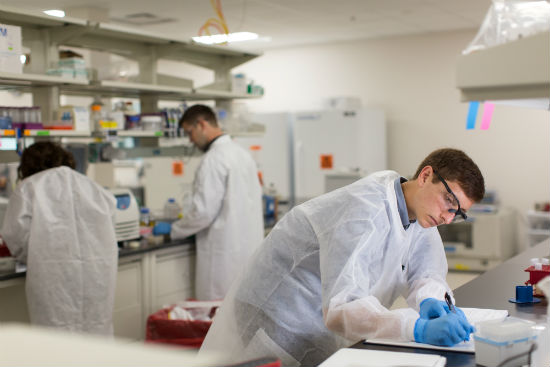
Locus Biosciences Gets CARB-X Funding for New UTI Therapy

Morrisville-based Locus Biosciences is at it again.
The clinical-stage biotechnology company has signed an agreement with a global non-profit to help fund a new CRISPR Cas3 antibacterial therapy to treat recurrent urinary tract infections (UTIs). Locus also intends to advance the product for lung, intra-abdominal and bloodstream infections.
The therapy, LPB-KP01, targets the bacterial pathogen K. pneumoniae. The non-profit organization, Combating Antibiotic-Resistant Bacteria Biopharmaceutical Accelerator (CARB-X) , will provide up to $12.5 million of the $14.8 million needed to advance LPB-KP01. CARB-X supports research and development to address the rising threat of drug-resistant bacteria.
Locus already is working on another investigational product, LBP-EC01, that uses CRISPR Cas3 to treat E. coli bacteria-caused UTIs. About half the $144 million needed to fund Phase 2 and Phase 3 clinical trials for that therapy is being provided by the Biomedical Advanced Research and Development Authority, a unit of the U.S. Department of Health and Human Services.
Close to 150 million people worldwide suffer from UTIs each year. Nearly 40% of patients have a recurring problem from difficult-to-treat strains of the infection that are resistant to commonly used antibiotics. The two Locus therapies have the potential to successfully treat more than 90% of all UTIs – regardless of underlying drug resistance – according to Locus.
Add to that an agreement the company inked last year with Janssen Pharmaceuticals, a unit of Johnson & Johnson, worth up to $818 million. That funding will be used to develop, manufacture and commercialize a CRISPER Cas3 product to attack infections of the respiratory tract and other organ systems.
CRISPR-enhanced pipeline targets wide range of ailments
The most recent funding from CARB-X “is another important validation of Locus’ rapid development of innovative CRISPR-Cas3-enhanced bacteriophage products...,” said Locus CEO Paul Garofolo. He noted that the support helps the company advance a pipeline of therapies targeted at the four most common bacterial pathogens, as well as inflammatory bowel disease and other microbiome-related disorders, infections associated with immune checkpoint inhibitors, and colorectal cancer.

Locus said its arsenal of products could potentially treat more than half the bacterial infections in the world and help tackle future pandemics.
The company got its start in 2015 as a North Carolina State University spin-out. The North Carolina Biotechnology Center supported its early development with $325,000 in loans. Three of Locus’ four scientific founders also have received NCBiotech grants totaling more than $300,000.
The company’s sweet spot is Type 1 CRISPER-Cas3-enhanced bacteriophage therapeutics. It starts with naturally occurring bacteriophage (phage) viruses that infect and replicate within bacteria. Locus increases their ability to kill germs by arming them with CRISPR-Cas3 DNA-targeting technology.
CRISPR – the acronym for Clustered Regularly Interspaced Short Palindromic Repeats – is a naturally occurring immune system that bacteria use to fight infection.
CRISPR Cas9 technology also a potentially potent infection fighter
In recent years, scientists have adopted one form of CRSPR – Cas9 – to edit DNA at specific points in the genome. Locus’ introduction of CRISPR-Cas3 is unique and important because, unlike Cas9, it shreds the target DNA, leading to cell death. That helps destroy residual bacteria that could otherwise survive infection by the bacteriophage and lead to drug resistance.
The Locus technology is a potentially powerful tool that can attack a variety of different infections. And it’s believed to be safe for healthy cells because it selectively kills targeted bacteria while leaving good bacteria in the body unharmed.
Bacteriophages have been used to fight pathogens since the early 20th century, but usually weren’t effective enough on their own to treat serious infections. So their use was relegated to the back burner as more successful antibiotics were developed.
Now, rising antibiotic resistance and the emergence of superbugs – along with new research and recent advances in CRISPR technology – have caused scientists to take a fresh look. And that’s playing to Locus’ strengths.
